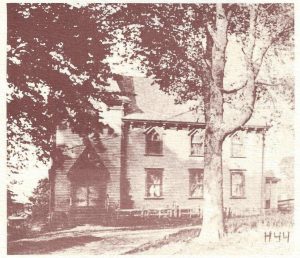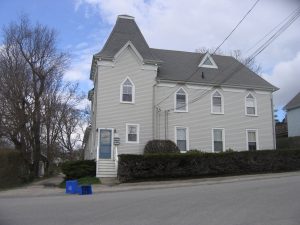In the development of religious thought, the Puritan idea, as embodied in the Congregational Church, the Roger Williams idea, as crystallized in the creed of the Baptists, and the principles of George Fox as exemplified by the Society of Friends, represented the sentiments of the Tiverton townspeople for nearly two hundred years. Reverend Samuel Longfellow preached the first Unitarian sermon in the Baptist Church at Stone Bridge around 1840 and modified the course of religious thinking. Reverend Charles J. Bowen was appointed chaplain of the great Camden Street Hospital in Baltimore during the Civil War, but he preached here before that, and in the summer of 1865.
 Thomas Whitridge of Baltimore offered the first contribution of $1000 toward construction of the building, and with donations from the many friends of the late Reverend Bowen and others, a combined chapel and hall was completed in 1876 on land previously owned by Charles F. Seabury. Seabury and his wife sold the land on October 11, 1875 to widow Annie M. Bowen, Horace H. Manchester, and George W. Gray for $400: a certain lot or tract of land situate in Tiverton aforesaid bounded and described as flows, viz: On the South by a highway called the green lane eighty feet more or less – on the West by land of Asa T. Lawton, one hundred and twenty four feet, on the North by other lands of the grantors Eighty feet more or less – to the base of a certain terrace or embankment, on the East by other lands of the grantors, along the base of the aforesaid terrace one hundred and twenty four feet to the highway, the grantors reserving a right of way across the east side of the above described lot to their land on the North side of the same.
Thomas Whitridge of Baltimore offered the first contribution of $1000 toward construction of the building, and with donations from the many friends of the late Reverend Bowen and others, a combined chapel and hall was completed in 1876 on land previously owned by Charles F. Seabury. Seabury and his wife sold the land on October 11, 1875 to widow Annie M. Bowen, Horace H. Manchester, and George W. Gray for $400: a certain lot or tract of land situate in Tiverton aforesaid bounded and described as flows, viz: On the South by a highway called the green lane eighty feet more or less – on the West by land of Asa T. Lawton, one hundred and twenty four feet, on the North by other lands of the grantors Eighty feet more or less – to the base of a certain terrace or embankment, on the East by other lands of the grantors, along the base of the aforesaid terrace one hundred and twenty four feet to the highway, the grantors reserving a right of way across the east side of the above described lot to their land on the North side of the same.
Thomas Whitridge grew up in the William Whitridge Estate, a 1770’s house that still stands on Stone Church Road in Tiverton. Whitridge’s father served as town doctor, and three of his brothers followed their father into medicine. Thomas moved to Baltimore, where he built a fleet of ships and became one of the nation’s largest importers of coffee, amassing the fortune that he used to endow Whitridge Hall in his hometown.
The building was managed by the Whitridge Hall and Bowen Memorial Chapel Association, more commonly known as the Whitridge Hall Association, incorporated in 1879, from which emerged the Tiverton Historical Society.
The Unitarian Chapel, called Bowen Memorial, opened in June of 1876. Services ended shortly after 1900. Among those conducting services were Dr. Peabody, Reverend Robert Colyer, Reverend Edward Everett Hale (author of the 1863 short story, “The Man Without a Country”), Doctor Briggs, Reverend Augustus Woodbury, Reverend Thomas Slicer, and Julia Ward Howe (the lyricist for the Civil War standard, “Battle Hymn of the Republic”). The Channing Conference and American Unitarian Association sold their interest in the hall to the Whitridge Hall Association for $1,500 in 1924. It was able to purchase the interest because the latter was an organization that promoted the hall as a community building and was an association that anyone could join: “New members may be admitted by a majority vote of the members present at any meeting of the association providing the applicants’ names have been submitted and approved by the board of directors,” according to the by-laws of the association, adopted April 13, 1926.
The building also contained a library and a reading room, and the Episcopalians held social events in the hall before their church was built. The Whitridge Hall and Bowen Memorial Chapel Association had two sections: “The Whitridge Hall Public Library” and “The Whitridge Hall Association”. The library was connected with the Sunday School of the Bowen Memorial Chapel since its inception, with Charles F. Seabury as its first supervisor, succeeded by Mary J. S. Stimson, his daughter, who faithfully served for more than fifty years. The library books were originally kept in the bookcases at the head of the main staircase in the hall, built by William Anthony for $50. Later, the library occupied the gentlemen’s dressing rooms, and until early 1925, it was located in the small social room at the right of the large main hall. The library received support from the Town and the State. Many books were donated by interested individuals. In the first available library report of 1882, the following excerpt is noted in the handwriting of Charles F. Seabury: “This library has grown from the needs of the people, by gifts, and by small appropriations by the state, and is without records.” No part of Whitridge Hall ever belonged to the Town of Tiverton. The library grew in just 20 years from a few donated books in 1881 to 4,000 volumes.
Whitridge Hall served as the launching pad for a memorable show business career. In the 1950’s, a summer theater troupe called this building home. The troupe hired an 18-year-old actor named Charles Nelson Reilly, who made his professional debut here as the detective in a play called “Broken Dishes.” Reilly became a show business star who regularly appeared on TV in the 1960’s and 70’s (such as “The Ghost & Mrs. Muir” and “The Match Game”), but he never forgot his acting debut at Whitridge Hall. The hall was used for dances in the 1960’s.
Eventually, many of the groups and churches Whitridge Hall once hosted found space of their own. The library moved to a fieldstone building on Highland Avenue bequeathed by a former school teacher, Lydia B. Essex, in memory of her mother; and the Historical Society moved its headquarters to the circa 1730 Chace-Cory House at Tiverton Four Corners, given to the Society in 1964 by Ambassador Middendorf.  Whitridge Hall’s use as a public building ceased and it was converted into apartments.
Whitridge Hall’s use as a public building ceased and it was converted into apartments.
You can own a piece of Whitridge Hall history: we sell dessert dishes and china in the Chace-Cory House gift shop! Other pieces of china used in the Hall’s banquets are on display in the pantry.
[from “A Patchwork History of Tiverton”, Rhode Island by the Tiverton Historical Society, 1976; from “Rhode Island Tercenterary 1636-1936 Historical Edition of Tiverton, Rhode Island” by the Tiverton Historical Society, 1936; and from Sakonnet Historical (http://sakonnethistorical.org/items/show/1). Deed excerpt from Land Evidence Records of Tiverton, Rhode Island, Book 26, Page 125.]
